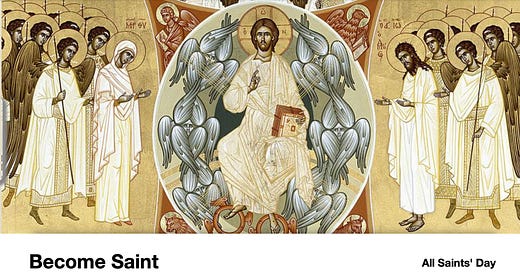Revelation 7:2-4, 9-14; 1 John 3:1-3; Matthew 5:1-12a
The Catholic novelist Leon Bloy wrote, "the only real sadness, the only real failure, the only great tragedy in life, is not to become a saint." The Book of Revelation opens the gates of heaven and allows us to see a great multitude of saints standing before the throne of God and the Lamb (Rev. 7:9). It must be an incredible experience to see God as He really is (1 John 3:2). No wonder that blessed Carlo Acutis, a computer wizard who died of leukemia at the age of 15, before his death said, "I want to go straight to heaven". But who can ascend the mountain of the Lord (Ps. 24:3)?
The eight beatitudes reveal "the goal of human existence" - participation in God's happiness (CCC, 1719) - and they are the only path that leads to that goal. They are Christian "Decalogue", "the Magna Charta of Gospel morality" (St. John Paul II), an announcement of future blessings and rewards that to some extent are already ours: "for theirs is the Kingdom of heaven" (Matt. 5:3,10; CCC, 1717). The one who puts them into practice will stand in God's holy place (Ps. 24:3-4).
In the sacrament of baptism, we have become God's children (1 John 3:1) and from that moment we begin the path towards that great reward in heaven promised by Jesus (Matt. 5:12). We should live in such a way to get it (1 Cor. 9:24) and the beatitudes can help us in achieving it. They contain a reference to the present and the future. The present is marked by suffering - poverty, sadness, injustice, and persecution, but the future promises transformation: "Blessed are those who mourn, for they will be comforted" (Matt. 5:4).
Faced with a choice between the fortune of his father and the poverty for Christ, St. Francis chose poverty. Torn between teaching the children of the rich or showing mercy to the poorest of the poor, St. Teresa of Calcutta chose the path of mercy. When in the 1960s the world was on the verge of a nuclear conflict, St John XXIII worked for peace by writing the encyclical "Pacem in Terris - Peace on Earth". The saints with their lives interpret the beatitudes for us and their testimony calls us to follow them. "Be imitators of me, as I am of Christ" (1 Cor. 11:1) wrote St. Paul who was persecuted for Christ (Matt. 5:12).
Those who stand before the throne of God and the Lamb came out of the great tribulation (Rev. 7:14). Though through many afflictions one enters the kingdom of God (Acts 14:22), "the sufferings of this present time are not worth comparing with the glory that is to be revealed to us" (Rom. 8:18; 1 John 3:3). This glory that is to be revealed in us is a mystery of communion "of life and love with the Trinity, with the Virgin Mary, the angels and all the blessed" (CCC, 1024), which exceeds our human imaginations. "No eye has seen, nor ear heard, nor the heart of man imagined, what God has prepared for those who love him" (1 Cor. 2:9).
At the time of his death, St. Dominic told his brothers: "I will be more useful to you and help you more effectively after death than during my lifetime". We hear a similar testimony from the mouth of St. Faustina: "My mission will not come to an end upon my death, but will begin" (Diary, 281). This is confirmed by our experience. Through the intercession of the saints, we have received many favors from God. But it is also confirmed by the teaching of the Church. "In the glory of heaven the blessed continue joyfully to fulfil God's will in relation to other men and to all creation" (CCC, 1029).
"The only great tragedy in life is not to become a saint". Let the vision of a great multitude of saints in heaven arouse in us the desire to join them and, like them, see the face of God (Ps. 24:6).




